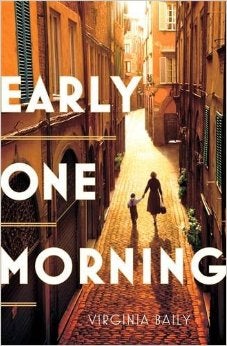Early One Morning, by Virginia Baily - book review: A fresh approach to this well-worn period
virago £12.99

Your support helps us to tell the story
From reproductive rights to climate change to Big Tech, The Independent is on the ground when the story is developing. Whether it's investigating the financials of Elon Musk's pro-Trump PAC or producing our latest documentary, 'The A Word', which shines a light on the American women fighting for reproductive rights, we know how important it is to parse out the facts from the messaging.
At such a critical moment in US history, we need reporters on the ground. Your donation allows us to keep sending journalists to speak to both sides of the story.
The Independent is trusted by Americans across the entire political spectrum. And unlike many other quality news outlets, we choose not to lock Americans out of our reporting and analysis with paywalls. We believe quality journalism should be available to everyone, paid for by those who can afford it.
Your support makes all the difference.Books pages are publishing their summer recommendations and readers might be confused to find this novel included. It’s set in Rome during the Second World War and begins as Jews are being deported to Auschwitz. Are we so jaded that a Holocaust novel can be enjoyed at the beach?
Despite its difficult opening scenes, this is more a family saga than a wartime novel, stretching from the scarred 1940s to the cool 1970s, from glorious Rome to suburban Cardiff.
The Holocaust aspect is but one strand of the story. Chiara Ravello, a young Italian woman, is preparing to flee Rome. Her nonna has a house in the hills where Chiara and her severely epileptic sister, Cecilia, will be safe. As they leave, they witness the forced evacuation of the ghetto. A Jewish mother, bundled into a lorry with her children, stares at Chiara. She is holding her young son and, in frantic, wordless communication, Chiara steps forward and lifts the boy to safety, claiming he is her nephew.
Admittedly, this happens far too easily, with little interrogation. There is little sense of threat from the Nazis, while the cruel deportation is described as a “hullaballoo”, but we might excuse this as it’s not a Holocaust novel. Indeed, the ghetto expulsion is merely a plot device to throw Chiara together with the little boy, Daniele.
The novel then skips back and forward in time, using past and present tense, and multiple points of view, though Chiara’s narrative is the central one. We learn that Daniele, in adulthood, falls into drugs and debt, then vanishes, but we don’t know what precipitates his fall. Chiara becomes a sturdy, intelligent woman, building a life for herself as a translator and enjoying Rome with her fashionable friends, but she has been deeply wounded by Daniele, and when she receives a phone call from a girl claiming to be his daughter, it forces her to confront the past.
Daniele is largely absent in the story, which punches a hollow in the narrative and makes Chiara’s furious love for him hard to understand as we only know the adult Daniele through hints of his downfall, none of which is pleasant.
The ending is tied up far too fast to be satisfying, but there are loving, intricate descriptions of Rome, “a place of such startling gold-and-white” where “electric cables hung like decorations on the walls”, and the novel’s premise is a fresh approach to this well-worn period.
Join our commenting forum
Join thought-provoking conversations, follow other Independent readers and see their replies
Comments